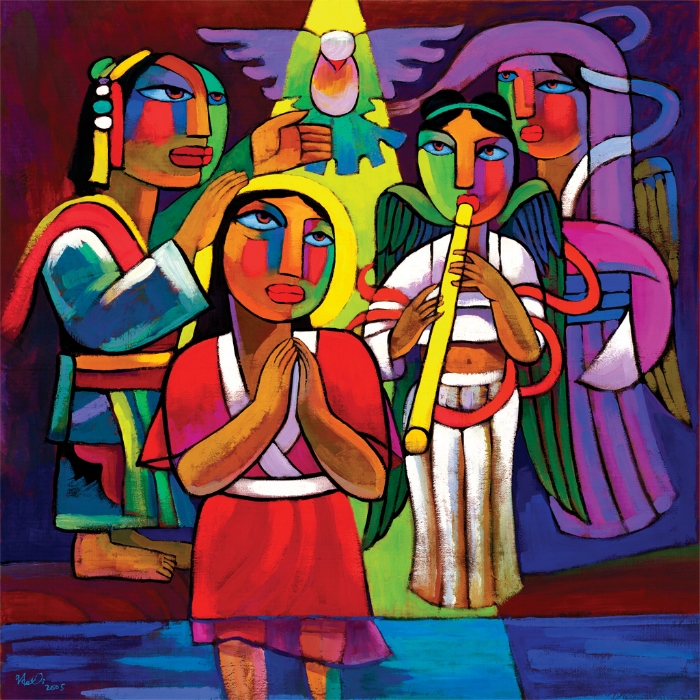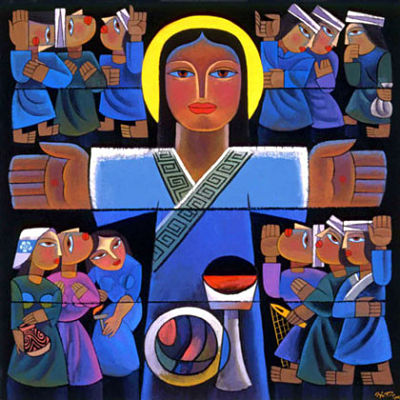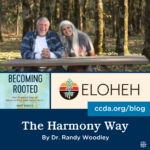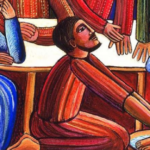Can you think of a time when you received hospitality from someone? Maybe it was an expression of kindness, a welcoming embrace, a warm meal, or a listening ear. Perhaps it took the form of someone who supported you when you didn’t feel you deserved it, or a new friend in an unfamiliar place.
Take a moment to live in that memory and soak in the feelings their hospitality provided you. Warmth, love, acceptance, solidarity, community, and empathy are some of the feelings that can stem from hospitality.
We practice and receive hospitality more often than we may realize. We find hospitality in the greatest commandment passage, Matthew 22:36-40, which calls us to love our neighbor as ourselves.
36 “Teacher, which is the most important commandment in the law of Moses?”
37 Jesus replied, “‘You must love the Lord your God with all your heart, all your soul, and all your mind.’ 38 This is the first and greatest commandment. 39 A second is equally important: ‘Love your neighbor as yourself.’ 40 The entire law and all the demands of the prophets are based on these two commandments.” (NLT)
Most of us are familiar with this commandment which calls us to love our neighbors. Let’s reexamine this well-known passage through the lens of hospitality.
When we open the toolbox of hospitality, we bring out such tools as empathy, altruism, open-handed generosity. We discard self-interest, judgement, and inaction. Empathy is the key to hospitality as it forces us to place ourselves in the shoes of our neighbors. Empathy creates a deeper understanding of why we extend hospitality to others. When we practice empathy in hospitality, we build solid foundations for relationships and community connections.
Take a moment and view this take on the hospitality tool, empathy.
Practicing Hospitality
Examining how we practice hospitality is integral to enhancing how we practice Christian Community Development. The Immerse Chapter on Listening to the Community informs us on how to practice listening, another tool in the hospitality toolbox.
Listening thrives on living room couches and front porch conversations; through neighborhood potlucks and playdates. You can’t expect to fit “listen to the community” into your empty calendar slots. Real listening happens over time as we build relationships with one another.
Listening to and empathizing with our neighbors
- affirms the value of people’s stories
- manifests fruits of the spirit
- lays down our power
- builds relationships through solidarity
- incarnates Christ’s hospitality
- centralizes our neighbor
Reflections
Practicing servanthood through hospitality is a radical task that Jesus lived and tasked us. It values everyone and builds kingdom community. It is an essential, repeated commandment that we must learn through discipline and repetition. Contemplate the following questions central to practicing hospitality:
- How are you welcoming your neighbor without judgement?
- With whom are you willing to practice hospitality? Consider your answer as revealing those needing inclusion.
- Which tools are used the most in your hospitality toolbox? Which are in need of repair or sharpening/honing?
Hospitality Meditation or Prayer
Meditate on the following verse and recount that you too were once a stranger. Ask God to speak to you as you consider practicing the instructions given in the Word:

http://www.stpaulswrj.org/st-pauls-blog/2018/1/4/announcements-for-sunday-january-7-2018
Leviticus 19:33-34 (NKJV) says:
33 ‘And if a stranger dwells with you in your land, you shall not mistreat him. 34 The stranger who dwells among you shall be to you as one born among you, and you shall love him as yourself; for you were strangers in the land of Egypt: I am the Lord your God.
This Lenten season, use this prayer to encourage the practice of hospitality…
Most High God, create in me the tools of your hospitality and love for my neighbor. Open my heart and eyes to those I would not ordinarily think of extending your love towards. Remove judgement from my mind and use me as an extension of your acceptance and love. Give me an open hand of generosity and a strong voice to speak with those who have a need for hospitality within my community and country. I praise you for offering me your grace and unconditional love. Use me to build up your kingdom community.

Mary Beth Meadows is the Executive Assistant to the Leadership Development and Training Director at CCDA. She is also a social worker who serves as an organizational consultant for trauma-informed care and ministry. She has a passion for justice, serving through solidarity and advocacy in her local Knoxville, Tennessee, community.






